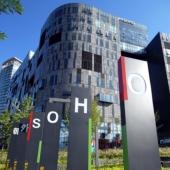by Russell Flannery

Billionaire couple targets Chinese, not foreign, businesses
SHANGHAI -- Chinese property developer Soho China, famed in Beijing for trendy architecture and its billionaire founders, is setting its sights on Shanghai. Rather than the city s Pudong district, where the city s financial hub is located and a frenzy of building is under way ahead of the city s Expo 2010, Soho is looking to the historic western side of town for profits.
Founded in 1995 by the husband and wife team of Pan Shiyi and Zhang Xin, Soho China said in mid-August it would spend $360 million to buy an office tower in Shanghai from Morgan Stanley . The building will be refitted and the name will be changed to The Exchange - Soho from Dong Hai Tower.
Yet that s only a start for Soho in China s most important international business hub. Soho expects China s property market to outperform the rest of the world, Chairman Pan Shiyi told Forbes in an interview. The whole world economy isn t good right now, but China s economy is different from the U.S. and Europe, he said. And among China s best places to invest, we think Shanghai s market still looks promising.
A successful IPO in Hong Kong in 2007 launched the Soho duo into the ranks of the world s wealthiest people. The company s shares were hurt as global shares fell amid the subsequent global downturn, but recovered from last year s low of HK $2.04 (26 cents) to a 2009 peak of HK $5.20 (67 cents) in June. They have trailed off by about 5% since the company announced its Shanghai investment amid an easing of shares globally, closing at HK $4.10 (53 cents) Tuesday. At that price, the couple s stake in Soho China was worth about $1.7 billion.
Soho is closely linked with Beijing property. In August, the company confirmed plans for a building that, even by Beijing s high standards for pushy architecture, will make a big splash. Consisting of five huge white pod-like structures designed by Zaha Hadid, a British-Iraqi architect who ranked 69th on Forbes list of the world s most powerful women in 2008, the new commercial site will sit opposite the Ministry of Foreign Affairs.
Soho has been talking about entering the Shanghai market since 2008 when prices started coming down amid the global recession and took advantage of pressure in the market among foreign investors looking to sell. Shanghai will become the focal point of China, if not Asia, in 2010 with its hosting of the World Expo, which is expected to attract 70 million visitors.
Soho s strategy in Shanghai is to focus on the older, western side of town, called Puxi, or west of the Huangpu River . This part of Shanghai has seen less exposure to the overseas businesses that have absorbed the brunt of the international downturn. Lujiazui (in Pudong) serves international companies, says Pan, but regardless of the location, the businesses most affected by the international economic slowdown in the past year have been international-oriented companies. As a result, the office buildings in Lujiazui have had the fastest declines in rents.
By contrast, when Pan looks at Puxi, he sees a thriving area populated by Chinese companies, including those from Zhejiang province. These businesses are finding opportunities amid China s growth and account for a greater share of China s GDP, Pan notes. And while Soho is also talking to sellers of buildings in the financial district of Pudong, the company remains singularly focused on Puxi, he said.
The location of The Exchange on Shanghai s iconic Nanjing Road makes Pan happy with his new buy, but most important, he says, is the convenient transportation nearby. The Jing an area is littered with pubs and restaurants popular among foreigners, pleasingly reminiscent of those around Pan s property in Beijing s Sanlitun district.
In Shanghai, the billionaire-owned Soho finds itself comfortably in the middle of a swath of buildings owned by other billionaire families from around Asia. Ronnie Chan, Hong Kong s 10th richest man (along with his brother Gerald) owns Plaza 66 and the nearby Kerry Center is owned by Robert Kuok the richest man in Malaysia. Great Eagle, controlled by Taiwanese-American billionaire Roger Wang, also owns a tower nearby. Pan expects that Shanghai customers for The Exchange may also come from pre-existing customers that Soho do business with in Beijing.
Pan, one of China s most popular bloggers and author of the book I Love Beijing Sanlitun said although many Chinese make much of the differences between Beijing and Shanghai, there s much in common between the country s two most important cities, including economic ambition. I love both Beijing and Shanghai, he declared.
Related News
Photos
More>>trade
market
- SOHO China - Commune Boutique Hotel Grand Opening
- SOHO China - Zhang Xin Wins 2004 Montblanc Arts Patronage Award
- SOHO China Wins the First Public Tender of a Piece of Land in the CBD of Beijing
- SOHO China - Jianwai SOHO Summer Carnival Begins
- SOHO China - Commune by the Great Wall Selected as One of the 100 Hot Hotels in





